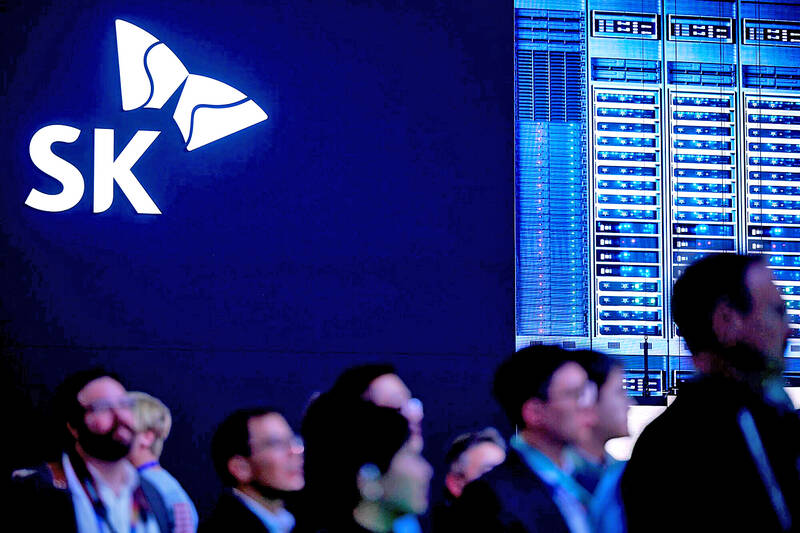SK Hynix Inc’s parent SK Group chairman Chey Tae-won, and Nvidia Corp cofounder Jensen Huang (黃仁勳) met on Wednesday to discuss artificial intelligence (AI), suggesting the two companies are exploring ways to deepen one of the most important relationships in AI hardware.
Chey and Huang talked about areas including moving AI into the physical realm. The leaders discussed SK Hynix’s high-bandwidth memory (HBM) chips, which work with Nvidia’s AI accelerators. The South Korean company has been quickening its pace of development to make sure it keeps up with Nvidia’s demands for faster evolution, Chey told reporters at the annual CES in Las Vegas.
SK Hynix has become a leading provider of essential memory to Nvidia during the post-ChatGPT AI boom, pushing aside longtime rival Samsung Electronics Co.

Photo: Bloomberg
Huang has discussed extending AI into more of the physical world to develop tools that can “proceed, reason, plan and act.” It would transform industries worth US$50 trillion, according to Nvidia.
Chey said he told Huang at their meeting that South Korea, a manufacturing powerhouse, is uniquely positioned to work with Nvidia on that front.
Both companies have benefited from the insatiable appetite that major companies and governments have for Nvidia’s chips, the gold standard for training AI algorithms.
SK Group is focusing on AI data centers to drive future growth, part of a strategy to transform South Korea’s second-biggest conglomerate into a technology-driven business.
SK Hynix’s exhibition at CES highlighted the company’s most advanced HBM chips — 16-layer HBM3E — as well as enterprise data storage solutions for data centers.
Separately, the Dutch government said it is holding talks with Nvidia and Advanced Micro Devices Inc regarding support for the construction of an AI facility in the Netherlands.
The facility would focus on the development and application of AI with the help of a supercomputer, according to a statement yesterday.
“Discussions were held with Nvidia about the delivery of hardware and support with knowledge in creating the required infrastructure,” it said.
The announcement came as Dutch Minister of Economic Affairs Dirk Beljaarts is visiting the US to strengthen cooperation between the Netherlands-based technology firms and US companies.
The ministry did not provide a timeline or specific details for the construction of the facility.

Nvidia Corp chief executive officer Jensen Huang (黃仁勳) on Monday introduced the company’s latest supercomputer platform, featuring six new chips made by Taiwan Semiconductor Manufacturing Co (TSMC, 台積電), saying that it is now “in full production.” “If Vera Rubin is going to be in time for this year, it must be in production by now, and so, today I can tell you that Vera Rubin is in full production,” Huang said during his keynote speech at CES in Las Vegas. The rollout of six concurrent chips for Vera Rubin — the company’s next-generation artificial intelligence (AI) computing platform — marks a strategic

Enhanced tax credits that have helped reduce the cost of health insurance for the vast majority of US Affordable Care Act enrollees expired on Jan.1, cementing higher health costs for millions of Americans at the start of the new year. Democrats forced a 43-day US government shutdown over the issue. Moderate Republicans called for a solution to save their political aspirations this year. US President Donald Trump floated a way out, only to back off after conservative backlash. In the end, no one’s efforts were enough to save the subsidies before their expiration date. A US House of Representatives vote

REVENUE PERFORMANCE: Cloud and network products, and electronic components saw strong increases, while smart consumer electronics and computing products fell Hon Hai Precision Industry Co (鴻海精密) yesterday posted 26.51 percent quarterly growth in revenue for last quarter to NT$2.6 trillion (US$82.44 billion), the strongest on record for the period and above expectations, but the company forecast a slight revenue dip this quarter due to seasonal factors. On an annual basis, revenue last quarter grew 22.07 percent, the company said. Analysts on average estimated about NT$2.4 trillion increase. Hon Hai, which assembles servers for Nvidia Corp and iPhones for Apple Inc, is expanding its capacity in the US, adding artificial intelligence (AI) server production in Wisconsin and Texas, where it operates established campuses. This

US President Donald Trump on Friday blocked US photonics firm HieFo Corp’s US$3 million acquisition of assets in New Jersey-based aerospace and defense specialist Emcore Corp, citing national security and China-related concerns. In an order released by the White House, Trump said HieFo was “controlled by a citizen of the People’s Republic of China” and that its 2024 acquisition of Emcore’s businesses led the US president to believe that it might “take action that threatens to impair the national security of the United States.” The order did not name the person or detail Trump’s concerns. “The Transaction is hereby prohibited,”